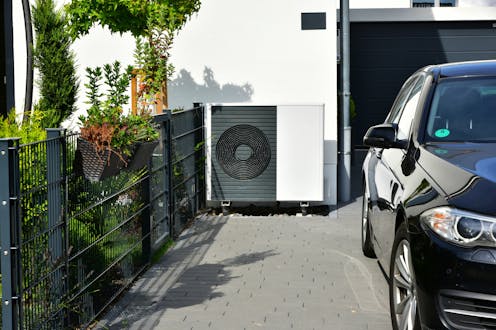Heat pumps can cut your energy costs by up to 90%. It’s not magic, just a smart use of the laws of physics
- Written by Alan Pears, Senior Industry Fellow, RMIT University

Heat pumps are becoming all the rage around a world that has to slash carbon emissions rapidly while cutting energy costs. In buildings, they replace space heating and water heating – and provide cooling as a bonus.
A heat pump extracts heat from outside, concentrates it (using an electric compressor) to raise the temperature, and pumps the heat to where it is needed. Indeed, millions of Australian homes already have heat pumps in the form of refrigerators and reverse-cycle air conditioners bought for cooling. They can heat as well, and save a lot of money compared with other forms of heating!
Even before the restrictions on Russian gas supply, many European countries[1] were rolling out heat pumps – even in cold climates. Now, government policies are accelerating change[2]. The United States, which has had very cheap gas in recent years, has joined the rush: President Joe Biden has declared[3] heat pumps are “essential to the national defence” and ordered production be ramped up.
The ACT government is encouraging electrification of buildings using heat pumps, and is considering legislation[4] to mandate this in new housing developments. The Victorian government recently launched a Gas Substitution Roadmap[5] and is reframing its incentives programs towards heat pumps. Other states and territories are also reviewing policies.
Read more: Biden just declared heat pumps and solar panels essential to national defense – here's why and the challenges ahead[6]
Just how big are the energy cost savings?
Relative to an electric fan heater or traditional electric hot water service, I calculate a heat pump can save 60-85% on energy costs, which is a similar range to ACT government estimates[7].
Comparisons with gas are tricky, as efficiencies and energy prices vary a lot. Typically, though, a heat pump costs around half as much for heating as gas. If, instead of exporting your excess rooftop solar output, you use it to run a heat pump, I calculate it will be up to 90% cheaper than gas.
Heat pumps are also good for the climate. My calculations show a typical heat pump using average Australian electricity from the grid will cut emissions by about a quarter relative to gas, and three-quarters relative to an electric fan or panel heater.
If a high-efficiency heat pump replaces inefficient gas heating or runs mainly on solar, reductions can be much bigger. The gap is widening as zero-emission renewable electricity replaces coal and gas generation, and heat pumps become even more efficient.

















